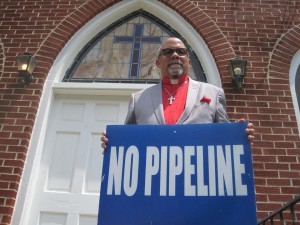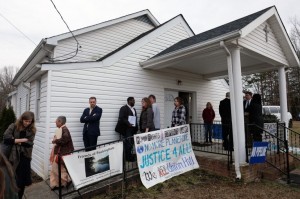From an Article by Sarah Vogelsong, Virginia Mercury, January 7, 2020
Calling Virginia’s review of a controversial compressor station in the historic Buckingham County freedmen’s community of Union Hill “arbitrary and capricious,” a federal court on Tuesday stripped the facility of its permit and ordered the State Air Pollution Control Board to reconsider the case.
The decision is the latest blow to the Atlantic Coast Pipeline (ACP) being developed by a consortium of companies led by Dominion Energy. The proposed Union Hill station is one of three compressor facilities planned along the 600-mile route from West Virginia to North Carolina.
“It’s the eighth permit that this pipeline has lost, either in federal court of having been withdrawn by a federal agency,” said Southern Environmental Law Center attorney David Neal, who represented the Friends of Buckingham group in opposition to the facility.
One such permit revocation has been appealed to the U.S. Supreme Court, which will hear the case in February.
Wednesday’s ruling by the 4th Circuit Court of Appeals in Richmond, penned by Judge Stephanie Thacker and joined by Chief Judge Roger Gregory and Judge James Wynn, offered harsh criticisms of both the Department of Environmental Quality and the air board, which issued a permit for the compressor station last year.
The judges condemned the agency and the board for their failure both to consider the use of electric motors rather than gas-fired turbines at the proposed station and to evaluate the environmental justice impacts of the facility.
Using motors, station opponents argued, “would eliminate almost all” of the site’s air pollution. According to the ACP’s permit application, 83 percent of the expected nitrogen oxide emissions and 95 percent of its particulate matter emissions would be due to its use of gas turbines.
The Virginia Department of Environmental Quality, however, argued that considering the use of electric rather than gas turbines would be “redefining the source,” a federal principle that states that the Environmental Protection Agency doesn’t have to consider an alternative emissions control technology if it “requires a complete redesign of the facility.”
The 4th Circuit ruling struck down that contention. Because such a doctrine doesn’t exist under state law, Thacker wrote, “we are not satisfied that the board provided a sufficient and rational explanation of its failure to consider electric turbines in place of gas-fired turbines.”
“We — and most importantly, the citizens of Virginia — do not know what the Virginia redefining the source doctrine is, how it works, and how this project meets its requirements,” the court stated.
On the environmental justice issue, the judges took a similarly firm stance, ruling that the Air Pollution Control Board “thrice erred” by failing to resolve conflicting evidence about the minority composition of the Union Hill community, failing to consider how that community might be injured beyond state and federal emissions standards and issuing a ruling based on incomplete or discounted evidence. The decision followed sharp questioning on environmental justice by Gregory of the state and Dominion Energy at an October hearing.
“Environmental justice is not merely a box to be checked, and the board’s failure to consider the disproportionate impact on those closest to the compressor station resulted in a flawed analysis,” the court declared.
Thacker’s ruling also responded directly to the claim made repeatedly by the state throughout the permitting process that the Union Hill facility would be more stringently regulated than any other similar station in the U.S.
“If true, it is admirable,” the judge wrote. “But these mantras do not carry the day. What matters is whether the board has performed its statutory duty to determine whether this facility is suitable for this site, in light of EJ and potential health risks for the people of Union Hill. It has not.”
In a statement from spokesman Aaron Ruby, Dominion nevertheless continued to emphasize that the permit “is the strictest air permit of any compressor station in the country, with protections far exceeding the U.S. EPA’s guidelines for vulnerable populations.”
The utility said that it planned to immediately begin resolving “the procedural issues identified by the court” and did not expect to deviate from the project’s current timeline.
“The Atlantic Coast Pipeline is needed now more than ever for our economy and to accelerate our path to a low-carbon future,” the company said. “This project is all about growing the economy and moving toward clean energy, and we remain totally committed to its completion.”
Environmental and local groups quickly hailed the decision Wednesday. Jon Mueller, Chesapeake Bay Foundation vice president for litigation called it “a major win for clean air, clean water, and the people of Union Hill.”
“But even more importantly, it’s also a major step forward for meaningful environmental justice,” he said. “The court has made clear that Virginia did not perform its legal duty to decide whether a major industrial facility in Union Hill would unfairly threaten the health of its vulnerable residents. That’s the crux of environmental justice.”
Kendyl Crawford, director of Virginia Interfaith Power and Light, praised “the direct citation of environmental justice concerns by the 4th Circuit.”
And in Union Hill, Friends of Buckingham president Chad Oba said: “It’s like I can breathe again.”
“The way things have gone in the past, it didn’t seem to matter what the truth was, so there’s always been a bit of doubt that we would win,” she said. But “we get to protect our community. We get to be heard. We are heard.”


